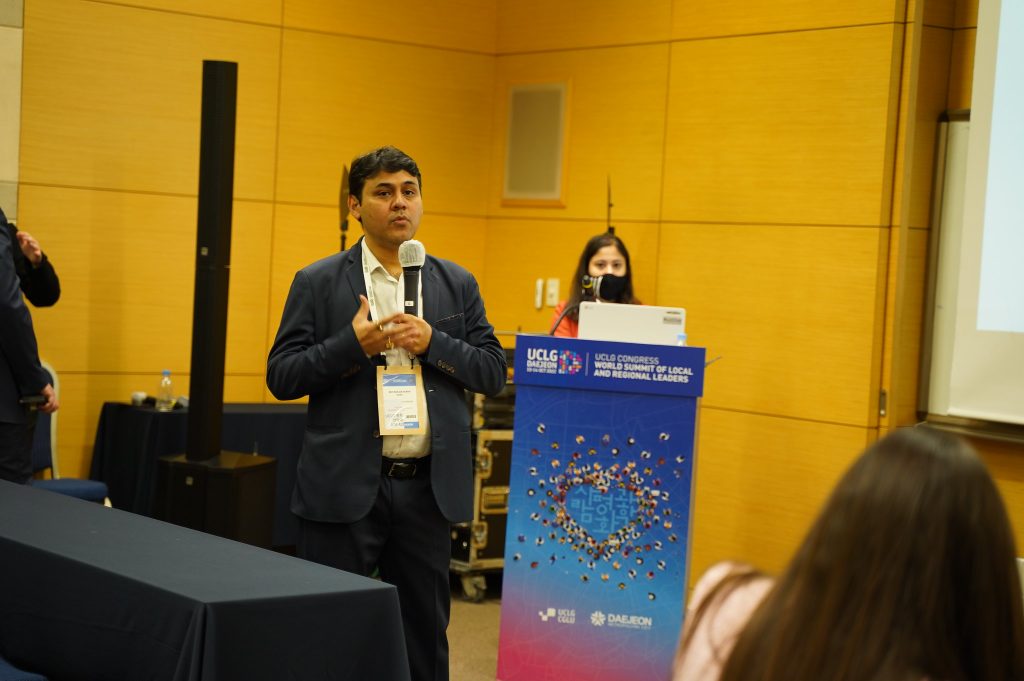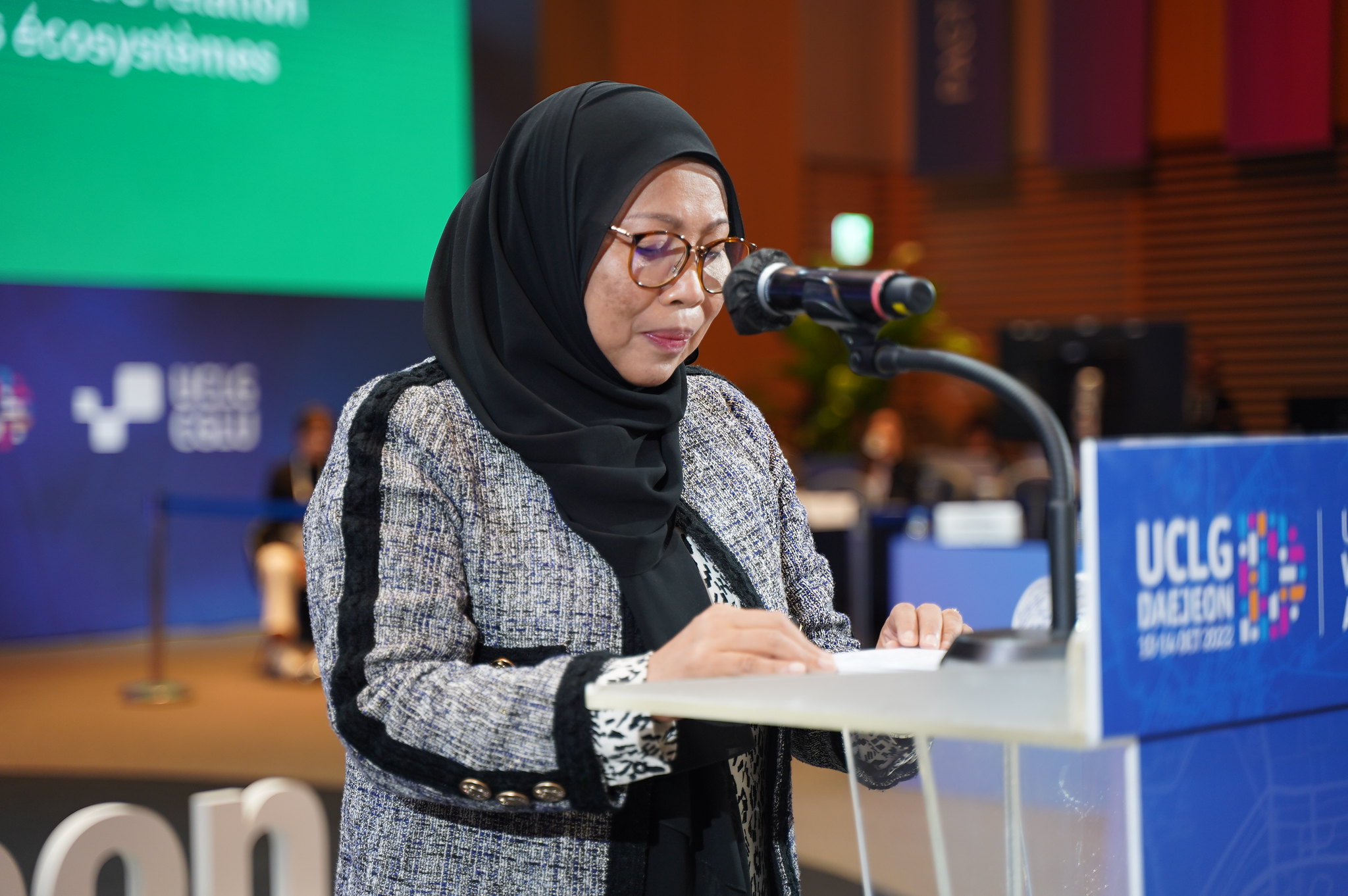As one of the most disaster-prone regions in the world, Asia-Pacific must build resiliency in an even riskier world. However, at the UCLG World Congress in 2022, the region was all about opportunity and hope since more local and regional governments are becoming equipped to implement sustainable policies and programmes that not only respond to disasters but also foresee them in the spirit of good governance and inclusive provision of public services. This will also contribute in a more holistic creation of an enabling environment towards cities’ Race to Zero and Resilience.
From aspects such as public space, healthcare service, climate-induced disasters, this sets the scene for UCLG ASPAC and its member cities it supports on the international platform with a single voice at the largest gathering of cities and local governments organised from 10th to 14th October, 2022.
Throughout the 4-day Congress, UCLG ASPAC’s representatives gave their food for thought in various development aspects in various main sessions and town halls on the Congress. Vice Governor of East Java, Mr. Emil Dardak spoke on cross-cutting issues related to climate change, such as the right to equitable, sustsainable and equitable food systems in the context of East Java region.

According to the European Comission publication of food systems analysis, incorporating food systems transformation can contribute to emissions-reduction targets of the 14 Nationally Determined Contributions (NDCs). For tropical countries such as Indonesia, Mr. Emil Dardak highlighted the importance of tackling structural inequalities and bridging knowledge gaps in food governance processes with the example of one of chili as East Java’s most highly demanded commodities.
However, Mr. Dardak also reminded attendees on listening and addressing the needs of some of the msot important stakeholders in food systems; farmers. “Before we can talk about sustainable food systems, let’s talk about welfare of food producers. One-third of our workforce are working in agriculture, contributing only to 12% of our economy, keeping in mind that there are 28 municipalities in my region.”, he said. He also mentioned that the majority of those working in agricultural sectors live on or near the poverty line, compounded by the ever-increasing need to make food affordable.
As a result, East Java has issued a regulation in an attempt to fill the supply chain gap by connecting offtake factories to farmers to ensure price transparency. Chili farmers are also linked to corporations in order to gain direct market access. Other efforts include taking into account what he refers to as “farmer exchange value” to ensure that farmers are not spending more than they make on things like expensive fertilisers and installing water pumps in the event of unexpected weather changes.
As a result, local government intervention can help East Java farmers and contribute to the eventual prevention of harmful or unsustainable farming practises. Consider locally led, context-specific “nature-positive” regenerative approaches to food systems that can not only provide people with readily available healthy and sustainable food while also addressing climate change and protecting the rights of communities, smallholder farmers, Indigenous Peoples, and women.
During the World Congress, UCLG ASPAC’s Statutory and Committee meetings also took place where members discuss current activities, progress and how next steps could be strengthened through joint-strategies to ensure that local and regional governments are always on the front and center of the efforts in achieving goals stemming from various global agendas.
For example, the Southeast Asia Committee Meetings, chaired by Dr. Bernadia Irawati, Secretary General of UCLG ASPAC, and moderated by Ms. Noraini, President of Klang Municipal Council, Malaysia, highlighted the need to re-strategize collaboration to achieve a climate-resilient future, citing the network in the ASEAN Mayors Forum as an example (AMF).
Ms. Noraini also reminded attendees that continuous effort in localising the SDGs is also highly related to handling climate change collaboratively, such as aligning city programme budget with SDG goals and climate targets, to “refraining from lifting support measures prematurely, pursue progressive fiscal systems to address rising inequalities, and use taxes to align behaviour with sustainable development.”, she added.

More crucial messages in climate action were also present during the UCLG ASPAC Circular Economy committee meeting, moderated by Mr. Ravi Ranjan Guru as Deputy Director General at All India Institute of Local Self Government (AIILSG). In the face of and now during post-pandemic recovery, dependance on non-renewable energy sources and lack of solid waste management is in dire need of attention. Mr. Ravi then stated how the circular economy pathway is useful in the journey to a more sustainable, circular, and just transition of local authorities and members of UCLG ASPAC.
For example, rapid economic and population growth in cities is unavoidable; however, solid waste treatment methods that rely on environmental engineering can be re-strategized by redesigning a resource’s life cycle to ensure that all products are recycled. To put it another way, mitigation strategies must be more systemic in order to deliver the highest impact.
In addition to that, UCLG ASPAC and Cites Unies France launched their collaborative short-documentary through the Solidarity Fund in support of the Indonesian municipality of Palu following the 2018 disaster. UCLG ASPAC was also present at the UCLG ASPAC Learning Forum where various learning sections of UCLG and partner organisations showcased local government-centred learning activities and products that keep people at the centre of local development.











